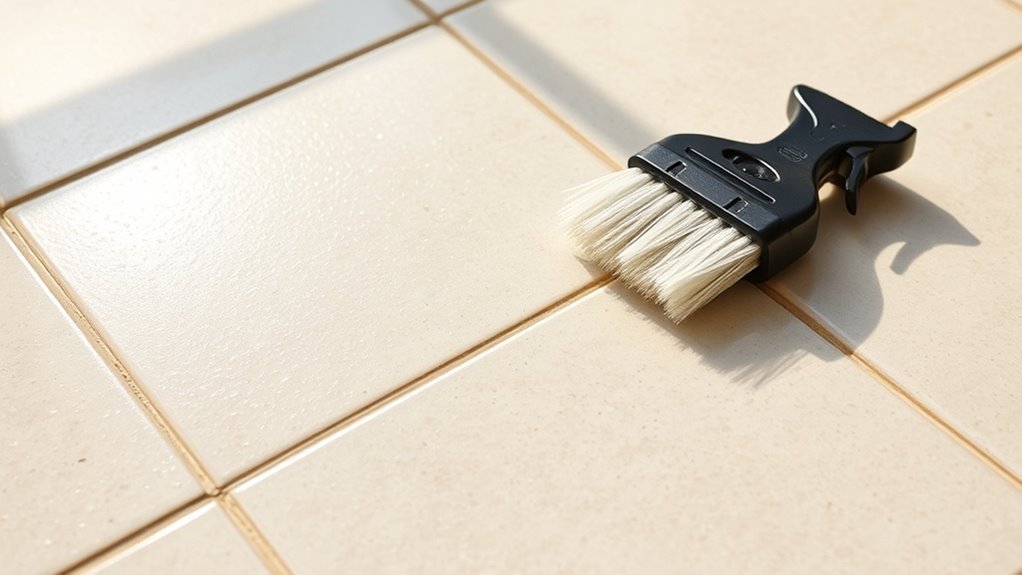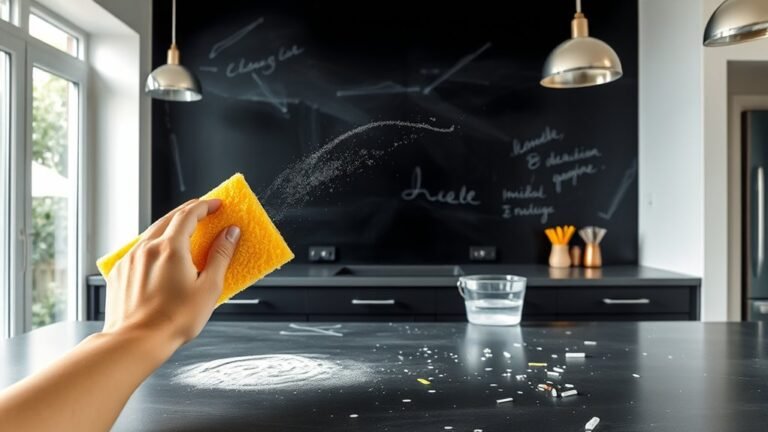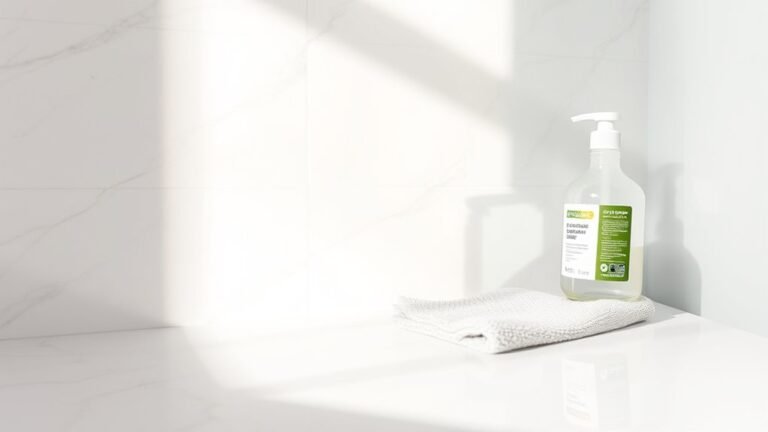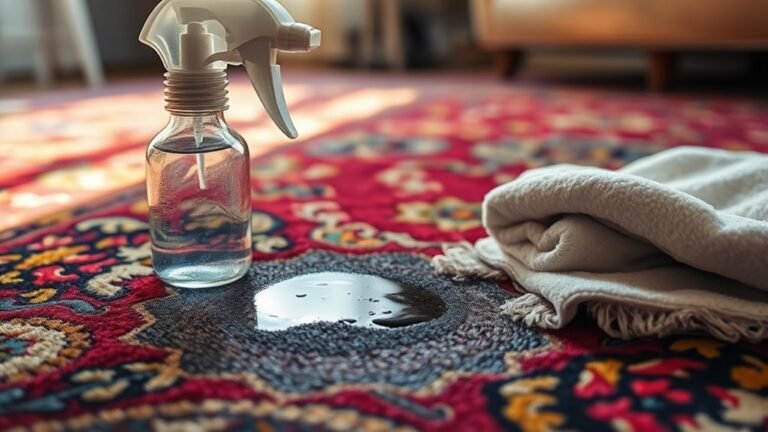Preventing Dirt Buildup on Grout
To prevent dirt buildup on your grout, clean it regularly using a soft brush with warm water and mild detergent, and avoid harsh chemicals that can damage it. Seal your grout periodically to block moisture and stains, which helps keep it looking fresh longer. Pay special attention to high-traffic and damp areas, and use natural remedies like baking soda for extra protection. If you want to discover more effective tips and maintenance strategies, keep exploring the best ways to care for your grout.
Understanding the Causes of Dirt Buildup on Grout
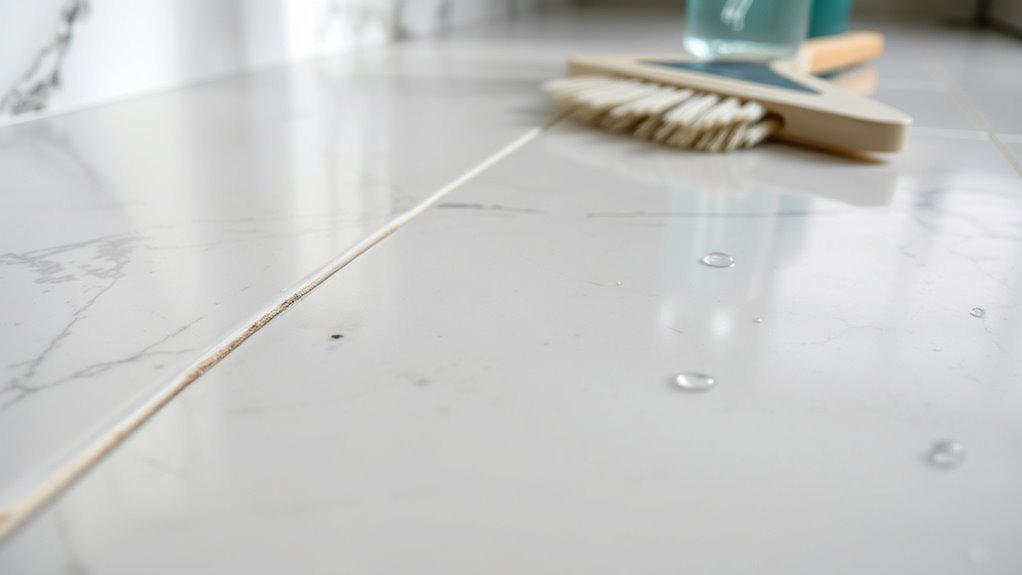
Although grout is designed to be durable, it’s prone to dirt buildup because it’s porous and often located in high-traffic areas. You should know that the grout composition plays a big role in how easily dirt sticks. Some grout mixes absorb moisture and particles more readily, making dirt harder to remove. Environmental factors like humidity, dust, and foot traffic also increase grime accumulation. If your space experiences frequent spills or heavy use, dirt will settle into those tiny pores faster than you might expect. Understanding these causes helps you take control, preventing stubborn stains from limiting your freedom to enjoy a clean, open space. Recognizing how grout composition and your surroundings affect dirt buildup empowers you to stay ahead without feeling trapped by constant maintenance.
Regular Cleaning Techniques for Grout Maintenance
Since grout is porous and prone to dirt buildup, regular cleaning is essential to keep it looking fresh and prevent stains from setting in. You can maintain your grout’s cleanliness by sticking to a routine maintenance schedule that fits your lifestyle. Here are four grout scrubbing techniques to keep dirt at bay:
- Use a soft-bristle brush with warm water and mild detergent for gentle scrubbing.
- Apply a paste of baking soda and water to stubborn spots, then scrub.
- Rinse thoroughly with clean water to avoid residue buildup.
- Dry the grout after cleaning to prevent moisture-related dirt accumulation.
The Role of Sealing in Protecting Grout
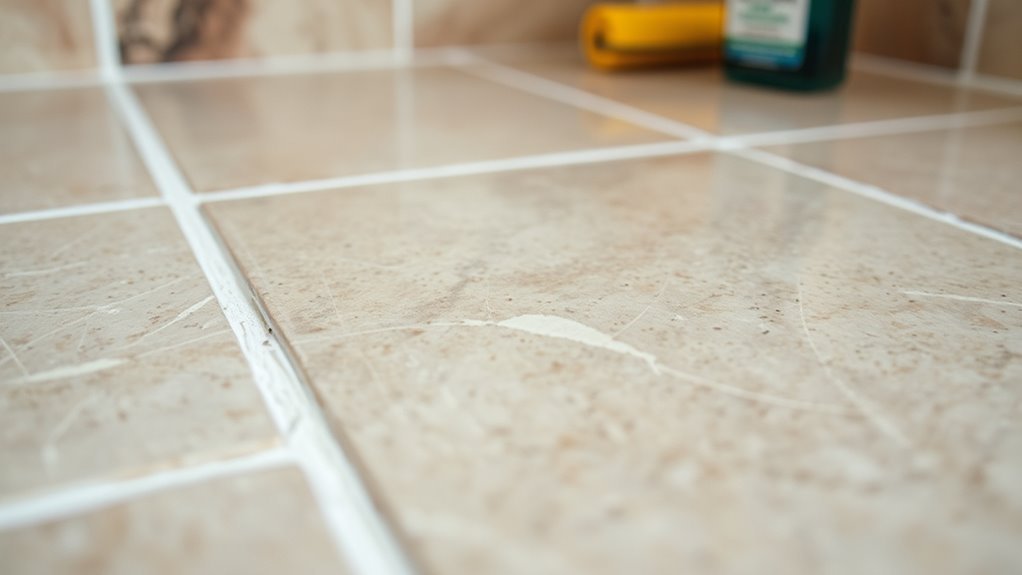
Keeping your grout clean through regular scrubbing helps a lot, but sealing it adds an extra layer of protection that you don’t want to overlook. Sealing techniques create a barrier that repels dirt, moisture, and stains, making your grout less prone to buildup and discoloration. By applying a quality sealer, you’re effectively locking in your hard work, ensuring your grout stays vibrant and fresh for longer. This not only saves you time but also extends grout longevity, giving you the freedom to enjoy your space without constant worry. Remember, sealing isn’t a one-time fix; reapplying as recommended keeps the protection strong. Embrace sealing as a smart, simple step toward maintaining grout that looks great and stands up to daily wear.
Choosing the Right Cleaning Products for Grout
When choosing cleaning products for your grout, it’s important to pick pH-balanced formulas that won’t damage the surface. You should avoid harsh chemicals like bleach or ammonia, as they can weaken the grout over time. Using gentle cleaners helps keep your grout clean without causing harm.
Ph-Balanced Cleaners
Although it might be tempting to grab any cleaner off the shelf, choosing pH-balanced products is essential for protecting your grout. When the pH levels are just right, your cleaner works effectively without damaging the grout’s surface. Here’s why you should opt for pH-balanced cleaners:
- They maintain the integrity of grout by preventing erosion.
- Cleaner effectiveness stays consistent, tackling dirt without harsh reactions.
- They reduce discoloration and staining over time.
- Using them frees you from frequent repairs and costly replacements.
Avoid Harsh Chemicals
You’ll want to steer clear of harsh chemicals when cleaning grout, as they can quickly wear down its surface and cause discoloration. Instead, opt for eco friendly alternatives that protect your grout and the environment. These gentle options allow you to maintain freedom in your cleaning routine without sacrificing effectiveness. Pair them with gentle scrubbing to lift dirt without damaging grout lines.
| Cleaning Product | Benefits |
|---|---|
| Baking Soda & Vinegar | Natural disinfectant |
| Hydrogen Peroxide | Stain remover |
| Castile Soap | Mild cleanser |
| Lemon Juice | Natural bleach |
| Olive Oil | Seals and conditions grout |
Choosing wisely keeps your grout fresh and your cleaning habits free from harsh toxins.
Using Natural Remedies to Prevent Grout Stains
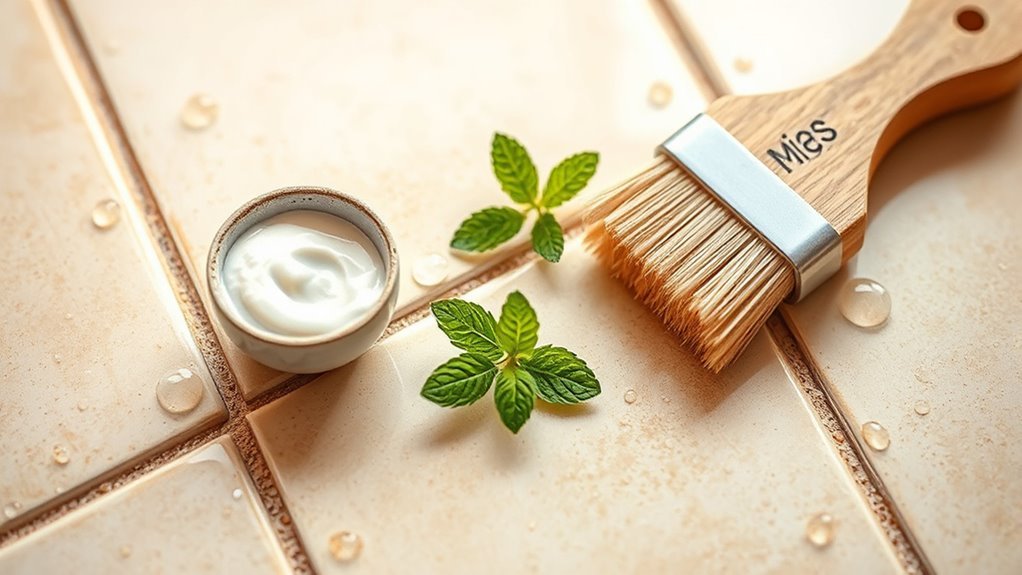
If grout stains have been a persistent problem, turning to natural remedies can be both effective and gentle on your surfaces. Using natural alternatives not only protects your grout but also supports your desire for freedom from harsh chemicals. To keep your grout looking fresh, consider these simple preventative measures:
Natural remedies offer effective, gentle grout care while avoiding harsh chemicals and keeping surfaces fresh.
- Regularly apply a baking soda and water paste to grout lines to repel dirt.
- Use vinegar and water spray to naturally break down stains without damage.
- Rub lemon juice on grout for its natural bleaching properties and fresh scent.
- Seal grout with a natural beeswax-based sealant to create a protective barrier.
Tips for Keeping High-Traffic Areas Clean
Natural remedies can help keep your grout stain-free, but high-traffic areas need extra care to stay clean over time. To protect these zones, place floor mats at entrances to catch dirt before it reaches your grout. You’ll want to choose mats that are easy to clean and sturdy enough to handle constant foot traffic. Additionally, shoe trays are a great way to encourage everyone to remove their shoes, preventing grime from spreading inside. Make it a habit to clean these mats and trays regularly, so they don’t become dirt reservoirs themselves. Quick daily sweeps and occasional mopping will also help you maintain a fresh look. By combining these simple steps, you’ll keep your grout looking sharp without feeling confined by extensive cleaning routines.
How to Address Mold and Mildew on Grout
Though grout is designed to be durable, it’s still prone to mold and mildew, especially in damp areas like bathrooms and kitchens. To keep your space fresh and free, focus on effective mold prevention and mildew removal. Here’s what you can do:
- Ventilate the area well to reduce moisture buildup.
- Clean grout regularly using a mix of baking soda and vinegar for natural mildew removal.
- Apply a grout sealer every six months to create a protective barrier against mold.
- Fix leaks and dripping faucets promptly to avoid constant dampness.
Frequently Asked Questions
Can Grout Color Affect Dirt Visibility and Cleaning Frequency?
Yes, grout color definitely affects dirt visibility and how often you need grout maintenance. Light grout shows dirt and stains more easily, so you’ll likely clean more often to keep it looking fresh. On the other hand, dark grout hides dirt better, giving you more freedom to clean less frequently. Choosing between light vs dark grout depends on how much time you want to spend on upkeep and the look you’re going for.
How Often Should Grout Be Resealed for Optimal Protection?
Did you know grout can absorb up to 20% more dirt if not properly sealed? For ideal protection, you should reseal your grout every 1-2 years. This is a key grout maintenance tip that helps keep your tiles looking fresh and reduces cleaning frequency. Sticking to this resealing frequency lets you enjoy your space freely, without constantly worrying about grime buildup or intensive cleaning sessions.
Are There Specific Grout Types More Resistant to Dirt Buildup?
Yes, you’ll find that epoxy grout and stain resistant grout are great choices if you want something that resists dirt buildup. Epoxy grout is super durable and doesn’t absorb stains or moisture easily, so it stays cleaner longer. Stain resistant grout also helps you enjoy a low-maintenance space without worrying about constant cleaning. Choosing these types gives you the freedom to relax and not stress over grout grime.
Can Professional Grout Cleaning Prevent Long-Term Damage?
You’ll find that professional techniques go beyond regular cleaning, offering deep restoration that protects your grout from long-term damage. These cleaning benefits include removing stubborn stains and sealing grout lines to prevent moisture and dirt penetration. By trusting experts, you’re freeing yourself from constant upkeep worries, letting you enjoy your space without hassle. So, investing in professional grout cleaning is a smart move for lasting beauty and durability.
Does Humidity Influence the Rate of Grout Staining?
Ever wonder why some grout stains faster than others, even in the same room? Humidity effects play a big role in this. When moisture levels are high, grout tends to absorb water, making it easier for dirt and mold to cling on and stain. If you want to keep your grout looking fresh, controlling humidity is key—it helps you maintain freedom from constant cleaning and stubborn stains.
